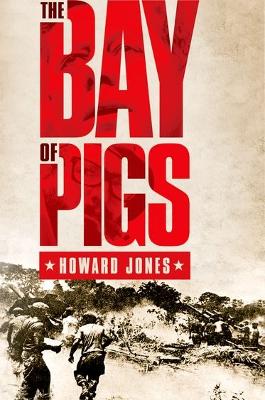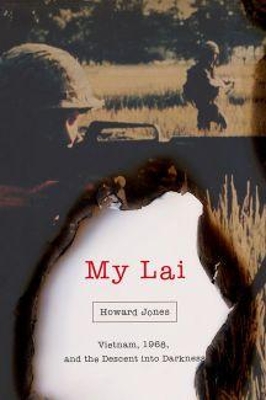Pivotal Moments in American History
2 total works
In January 1959, as Fidel Castro entered Havana in triumph, Americans hailed the revolutionary as a hero. Then came Castro's increasingly anti-American talk, the rise in his regime of the openly Marxist Che Guevara and Raúl Castro, and seizures of American-owned assets. In little more than a year, President Dwight D. Eisenhower concluded that Castro must go.
In The Bay of Pigs, Howard Jones provides a concise, incisive, and dramatic account of the disastrous attempt to overthrow Castro. He deftly examines the train of missteps and self-deceptions that led to the invasion of U.S.-trained exiles at the Bay of Pigs. Ignoring warnings from the ambassador to Cuba, the Eisenhower administration put in motion an operation that proved nearly unstoppable even after the inauguration of John F. Kennedy. Meanwhile, the CIA and Pentagon both voiced confidence
in the outcome of the invasion, especially after coordinating previous successful coups in Guatemala and Iran. As a vital part of the Cuban effort, the CIA sought to incite a popular insurrection by recruiting the Mafia's help in engineering Castro's assassination on the eve of the invasion. And so
the Kennedy administration launched the exile force toward its doom in Cochinos Bay on April 17, 1961.
Jones gives a riveting account of the battle—and the confusion in the White House—before moving on to explore its implications. The Bay of Pigs, he writes, set the course of Kennedy's foreign policy. It was a humiliation for the administration that fueled fears of Communist domination and pushed Kennedy toward a hard-line "cold warrior" stance. But at the same time, the failed attack left him deeply skeptical of CIA and military advisers and influenced his later actions during the Cuban
missile crisis.
Richly researched, vividly written, The Bay of Pigs offers an engaging and thoughtful account of the turning point in Kennedy's foreign policy and indeed in foreign policy for decades to come.
In The Bay of Pigs, Howard Jones provides a concise, incisive, and dramatic account of the disastrous attempt to overthrow Castro. He deftly examines the train of missteps and self-deceptions that led to the invasion of U.S.-trained exiles at the Bay of Pigs. Ignoring warnings from the ambassador to Cuba, the Eisenhower administration put in motion an operation that proved nearly unstoppable even after the inauguration of John F. Kennedy. Meanwhile, the CIA and Pentagon both voiced confidence
in the outcome of the invasion, especially after coordinating previous successful coups in Guatemala and Iran. As a vital part of the Cuban effort, the CIA sought to incite a popular insurrection by recruiting the Mafia's help in engineering Castro's assassination on the eve of the invasion. And so
the Kennedy administration launched the exile force toward its doom in Cochinos Bay on April 17, 1961.
Jones gives a riveting account of the battle—and the confusion in the White House—before moving on to explore its implications. The Bay of Pigs, he writes, set the course of Kennedy's foreign policy. It was a humiliation for the administration that fueled fears of Communist domination and pushed Kennedy toward a hard-line "cold warrior" stance. But at the same time, the failed attack left him deeply skeptical of CIA and military advisers and influenced his later actions during the Cuban
missile crisis.
Richly researched, vividly written, The Bay of Pigs offers an engaging and thoughtful account of the turning point in Kennedy's foreign policy and indeed in foreign policy for decades to come.
On the early morning of March 16, 1968, American soldiers from three platoons of Charlie Company (1st Battalion, 20th Infantry Regiment, 11th Brigade, 23rd Infantry Division), entered a group of hamlets located in the Son Tinh district of South Vietnam, located near the Demilitarized Zone and known as "Pinkville" because of the high level of Vietcong infiltration. The soldiers, many still teenagers who had been in the country for three months, were on a "search and
destroy" mission. The Tet Offensive had occurred only weeks earlier and in the same area and had made them jittery; so had mounting losses from booby traps and a seemingly invisible enemy. Three hours after the GIs entered the hamlets, more than five hundred unarmed villagers lay dead, killed in cold
blood. The atrocity took its name from one of the hamlets, known by the Americans as My Lai 4. Military authorities attempted to suppress the news of My Lai, until some who had been there, in particular a helicopter pilot named Hugh Thompson and a door gunner named Lawrence Colburn, spoke up about what they had seen. The official line was that the villagers had been killed by artillery and gunship fire rather than by small arms. That line soon began to fray. Lieutenant William Calley, one of
the platoon leaders, admitted to shooting the villagers but insisted that he had acted upon orders. An expose of the massacre and cover-up by journalist Seymour Hersh, followed by graphic photographs, incited international outrage, and Congressional and U.S. Army inquiries began. Calley and nearly
thirty other officers were charged with war crimes, though Calley alone was convicted and would serve three and a half years under house arrest before being paroled in 1974. My Lai polarized American sentiment. Many saw Calley as a scapegoat, the victim of a doomed strategy in an unwinnable war. Others saw a war criminal. President Nixon was poised to offer a presidential pardon. The atrocity intensified opposition to the war, devastating any pretense of American moral superiority. Its effect
on military morale and policy was profound and enduring. The Army implemented reforms and began enforcing adherence to the Hague and Geneva conventions. Before launching an offensive during Desert Storm in 1991, one general warned his brigade commanders, "No My Lais in this division-do you hear me?"
Compelling, comprehensive, and haunting, based on both exhaustive archival research and extensive interviews, Howard Jones's My Lai will stand as the definitive book on one of the most devastating events in American military history.
destroy" mission. The Tet Offensive had occurred only weeks earlier and in the same area and had made them jittery; so had mounting losses from booby traps and a seemingly invisible enemy. Three hours after the GIs entered the hamlets, more than five hundred unarmed villagers lay dead, killed in cold
blood. The atrocity took its name from one of the hamlets, known by the Americans as My Lai 4. Military authorities attempted to suppress the news of My Lai, until some who had been there, in particular a helicopter pilot named Hugh Thompson and a door gunner named Lawrence Colburn, spoke up about what they had seen. The official line was that the villagers had been killed by artillery and gunship fire rather than by small arms. That line soon began to fray. Lieutenant William Calley, one of
the platoon leaders, admitted to shooting the villagers but insisted that he had acted upon orders. An expose of the massacre and cover-up by journalist Seymour Hersh, followed by graphic photographs, incited international outrage, and Congressional and U.S. Army inquiries began. Calley and nearly
thirty other officers were charged with war crimes, though Calley alone was convicted and would serve three and a half years under house arrest before being paroled in 1974. My Lai polarized American sentiment. Many saw Calley as a scapegoat, the victim of a doomed strategy in an unwinnable war. Others saw a war criminal. President Nixon was poised to offer a presidential pardon. The atrocity intensified opposition to the war, devastating any pretense of American moral superiority. Its effect
on military morale and policy was profound and enduring. The Army implemented reforms and began enforcing adherence to the Hague and Geneva conventions. Before launching an offensive during Desert Storm in 1991, one general warned his brigade commanders, "No My Lais in this division-do you hear me?"
Compelling, comprehensive, and haunting, based on both exhaustive archival research and extensive interviews, Howard Jones's My Lai will stand as the definitive book on one of the most devastating events in American military history.

